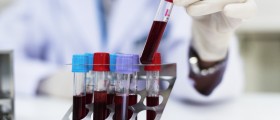High levels of protein in blood are always a sign of some serious underlying condition. The problem regarding excess of proteins should be taken seriously and dealt with without any delay. Additionally, such state of affairs apart from being harmful for the entire body interferes in certain processes like blood donation.
Serum Proteins in Blood
Normally, the blood contains small amounts of different types of proteins that are known as serum proteins. Serum proteins make up 6-8% of the blood and they are important for different functions in the body. Serum proteins promote proper functioning of the immune system. Apart from that, serum proteins regulate cell function. For instance, they represent circulatory transport molecules for other substances including lipids, hormones, vitamins as well as metals. Proteins also serve as enzymes and are complement components while some of them act as specific precursors.

Blood proteins level higher than normal serum proteins count is always a warning sign of some medical problem. To measure exact levels of the blood proteins there is a test known as “total protein test”. Electrophoresis, is on the other hand, a valuable test that estimates the individual amount of serum proteins. Electrophoresis is a powerful diagnostic tool and is of major importance when it comes to monitoring clinical progress. As for total serum proteins, the blood contains 60% of albumin, 30% of globulins, 4% of fibrinogen and 1% of regulatory proteins.
Higher Level of Proteins in Blood
High protein levels in blood are not caused by high-protein diet. Instead, such increase usually occurs due to different underlying conditions.
Protein level may increase in case of impaired immune system. High blood protein levels commonly occur due to hepatitis, HIV and AIDS. A person that has elevated protein levels in the blood usually has to undergo certain tests that can confirm any of these conditions. Every chronic inflammation or infection, such as rheumatoid arthritis, can affect the immune system. Dysfunction of the immune system is commonly characterized by symptoms like nausea, decreased appetite, unusual weight loss, severe fatigue and constant fever.
Multiple myeloma is a cancer of the blood and begins in the plasma cells located in bone marrow. This cancer leads to weakness of the immune system because the body is unable to produce red blood cells, white blood cells and platelets. This cancer may cause pain, numbness, paralysis, anemia and damage of bones. Multiple myeloma is characterized by the presence of abnormal proteins in blood (noticeable increase in certain type of proteins), bone pain, increased susceptibility to infections, bleeding problems and anemia related symptoms such as fatigue, tiredness, and shortness of breath.
High protein levels in blood may be additionally caused by Waldenstrom’s disease, which is a cancer of lymphocytes. Waldenstrom’s disease is responsible for symptoms such as weakness, extreme fatigue, loss of weight, enlarged lymph glands, nose bleeds and an increase in blood viscosity. Thickening of the blood affects functions of the brain and may cause the following neurological symptoms: blurred vision, headache and in rare instances stroke and coma.
- Ten volunteers (3 males and 7 females) between the ages of 18 and 65 were recruited from the Aberdeen area. They were ascertained as healthy by a general medical examination including an haemotinic assessment, and volunteers were only included if they were not taking aspirin or aspirin-containing drugs, other anti-inflammatory drugs, or any drugs or herbal medicines known to alter platelet function or the haemostatic system in general.
- Here we present data on the amount and the variability of proteins available from platelets, PBMC, plasma, urine and saliva from healthy volunteers for proteomics analysis after overnight or 36 h fasting. This information is essential for informing the design and defining the expected scale of protein changes in human studies using proteomics.
- Whole blood platelet counts in the four baseline samples from each subject ranged from 178 to 409 × 106/mL whole blood with an intra-individual coefficient of variation (CV) ranging from 2 to 18% and an inter-individual CV of 20–22%.
- Whole blood PBMC counts in the four baseline samples from each subject ranged from 1.1 to 3.7 × 106/mL with an intra-individual CV ranging from 4 to 16% and an inter-individual CV ranging from 25 to 32%.
- The amount of protein extracted from plasma during baseline from each subject ranged from 53.9 to 78.2 ?g/?L. The intra-individual CV in baseline plasma protein yields ranged from 3 to 14% and the inter-individual CV ranged from 6 to 12%. The degree of fasting had no significant effect on plasma protein yield, and the yield was not dependent on age or BMI, as measured by ANOVA.
- The amount of collected morning urine samples from each subject ranged from 21 to 465 g. The amount of protein extracted from morning urine baseline samples ranged from 0.9 to 8.6 mg/dL.
- The amount of protein extracted from saliva during baseline from each subject ranged from 0.07 to 0.95 mg protein per mL saliva. The intra-individual CV in baseline saliva protein yields ranged from 14 to 123% and the inter-individual CV ranged from 56 to 80%. The degree of fasting had no significant effect on protein yield, and yield was not dependent on age or BMI, as measured by ANOVA.
To prevent high protein levels in blood from occurring it is important to have healthy balanced diet. Regular intake of rich sources of vitamin C and fibers provide adequate filtering by the kidneys which is vital for keeping proper levels of protein in blood. Adequate diet can also promote the immune system. Some disease, however, cannot be prevented.
Does This Affect Giving Blood?
As for donating blood, no matter how this act humane and unselfish is, it simply cannot be performed by each and every individual. Today prior to donating blood all people are examined and their blood is subjected to specific tests. They have their total blood count checked and their blood is also tested for specific infections that can easily be transmitted to blood recipients. This testing is extremely important for prevention of transmission of HIV, hepatitis C and other such infectious illnesses.
Normally, an individual who is supposed to donate blood must be healthy and without any active disease. There are certain criteria doctors take into consideration when determining whether the person is suitable for blood donation. Logically, patients with chronic illnesses such as rheumatoid arthritis, those suffering from infectious diseases like HIV/AIDS, hepatitis C as well as patients with malignant cancers (multiple, myeloma and leukemias) are not suitable candidates to donate blood. Many times they need blood donation themselves.
So, when taken all the mentioned into consideration it is clear that each and every condition characterized by high level of proteins in blood requires proper evaluation and , if necessary, adequate treatment. These individuals may discuss potential blood donation with their health care provider who will decide whether they are capable of engaging in such activity.
Blood Donation Side Effects
Apart from being potentially detrimental for people with high level of proteins in the blood, blood donation carries mild side effects healthy individuals easily overcome. For instance, one may experience bruises(hematoma) at the site of needle insertion, vertigo, fainting and in rare occasions loss of consciousness. Fortunately, after a couple of days the given blood will be replenished with no consequences whatsoever.

















Your thoughts on this
Loading...